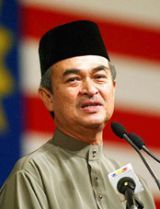Malaysia PM visits Darfur, seeks firmer Sudan ties
April 18, 2007 (KUALA LUMPUR) — Malaysia’s premier has visited Darfur, a violent corner of Sudan where at least 200,000 people have been killed since 2003, voicing concern over an issue that has shadowed commercial ties between the two nations.

“We must commit ourselves to help in any way we can,” Prime Minister Abdullah Ahmad Badawi told Malaysian reporters after visiting a refugee camp on Tuesday, escorted by Sudan’s energy minister.
“I have decided that I should approach the leaders of Organisation of Islamic Conference and Islamic Development Bank to extend whatever help that can be given to the government of Sudan,” Malaysian state news agency Bernama quoted him as saying.
Abdullah is chairman of the 57-nation Organisation of Islamic Conference, the world’s largest Islamic body.
“They need schools and water supply. They also need medical aid,” he said of Darfur’s refugees. “They also want to be reassured that they can live in peace and that is why there is a need for security. If all this is done, the people can be motivated to leave the camps.”
Abdullah’s visit followed bilateral meetings in the capital, Khartoum, where he voiced support for Sudan’s government and hoped the West would not impose sanctions on Sudanese firms.
Malaysian state oil company Petronas has interests in nine oil fields in Sudan and a refinery project in Port Sudan, all involving partnerships with the Sudanese state. It pumped 81,600 barrels of oil from Sudan in the year ended March 2006, about a fifth of the company’s total international oil and gas production.
Petronas is expanding aggressively abroad as oil fields mature at home. Malaysia is the second-largest investor in Sudan after China, the local New Straits Times said.
Petronas chief Hassan Merican accompanied the premier on his visit to Khartoum, Malaysian media said. The firm has been seeking access to its oil concessions in Sudan’s semi-autonomous south, where the government recently set new terms.
Oil companies from China, India and the Middle East also operate in Sudan, including China National Petroleum Corp, Sinopec and India’s Oil and Natural Gas Corp. The United States imposes trade sanctions against Sudan.
As Abdullah visited Darfur, Western powers pressed Sudan to allow a big U.N. peacekeeping force into the region, to back up an African Union force already operating there.
The violence began in 2003 after rebels rose up against the government, saying Khartoum was discriminating against non-Arab farmers there.
Khartoum mobilised proxy Arab militia to help quell the revolt. Some militiamen pillaged villages and killed civilians in violence that Washington described as genocide. But Sudan calls these militiamen outlaws and denies backing them.
(Reuters)
